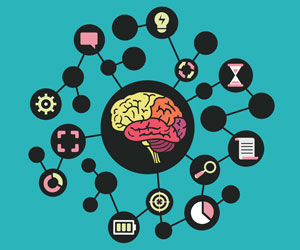A LOOK INTO THE SCIENCE OF ATTENTION AND FOCUS
My friends have been complaining to me like this - "Dude, I don't know why but my mind is wandering a lot and I'm struggling to stay focused in what I'm doing. Can you please suggest me something to help me focus better?" So I decided to write this blog mainly for them and for many others who face the same issue.. When we're reading, our minds typically wander anywhere from 20 to 40 % of the time. Voluntarily keeping our attention on one thing continuously can take a lot of effort, so it's not surprising that many struggle with this sometimes. Luckily, there are ways to keep our attention spans from burning out, once we understand how they work.
Our brain is split into 2 systems - System 1 and system 2. System 1 is the involuntary, always - on network in our brains that takes in stimuli and process it. It's the system that makes automatic decisions for us, like turning our heads when we hear our names or freezing when we see a spider. System 2 runs the voluntary parts of our brain. It processes suggestions offered by System 1, makes final decisions, makes final decisions and chooses where to allocate our attention. The funny thing about how these systems work is that we assume a lot of the things we do are purely conscious decisions made by System 2. In fact, almost everything we consciously decide on is based on automatic reactions and suggestions fed to us by System 1. System 2 is in charge of anything that takes willpower and self - control, and anything that's too difficult for System 1.
Although System 2 is running our attention and our concentration, there's only so much to go around, and it takes a lot of effort to stay focused on something. We're bombarded all the time by distractions, which the System 2 part of our brain has to fight against.
If you've ever had something emotional weighing on your mind, you'll know how hard it is to block out that kind of distraction. If something is upsetting us, our brains want us to find a solution, so we won't keep worrying about it. Putting it off doesn't help us concentrate, because we truly can't let go of those worrying thoughts until we have a plan to work through it.
It is not the chatter of people around us that it's the most powerful distractor, but rather the chatter of our own minds. Even worse is that on average, when our minds wander, they tend to skew towards negative thoughts, and focus on self - centered thoughts more than anything else.
So what's the answer? Well, staying focused takes a lot of work. Just like our physical muscles, our attention "muscle" gets fatigued when we overwork it. Pushing ourselves to cognitive exhaustion means we end up mentally fatigued: less effective at work, more easily distracted, and more irritable.
Our brain is split into 2 systems - System 1 and system 2. System 1 is the involuntary, always - on network in our brains that takes in stimuli and process it. It's the system that makes automatic decisions for us, like turning our heads when we hear our names or freezing when we see a spider. System 2 runs the voluntary parts of our brain. It processes suggestions offered by System 1, makes final decisions, makes final decisions and chooses where to allocate our attention. The funny thing about how these systems work is that we assume a lot of the things we do are purely conscious decisions made by System 2. In fact, almost everything we consciously decide on is based on automatic reactions and suggestions fed to us by System 1. System 2 is in charge of anything that takes willpower and self - control, and anything that's too difficult for System 1.
Although System 2 is running our attention and our concentration, there's only so much to go around, and it takes a lot of effort to stay focused on something. We're bombarded all the time by distractions, which the System 2 part of our brain has to fight against.
If you've ever had something emotional weighing on your mind, you'll know how hard it is to block out that kind of distraction. If something is upsetting us, our brains want us to find a solution, so we won't keep worrying about it. Putting it off doesn't help us concentrate, because we truly can't let go of those worrying thoughts until we have a plan to work through it.
It is not the chatter of people around us that it's the most powerful distractor, but rather the chatter of our own minds. Even worse is that on average, when our minds wander, they tend to skew towards negative thoughts, and focus on self - centered thoughts more than anything else.
So what's the answer? Well, staying focused takes a lot of work. Just like our physical muscles, our attention "muscle" gets fatigued when we overwork it. Pushing ourselves to cognitive exhaustion means we end up mentally fatigued: less effective at work, more easily distracted, and more irritable.




PROBABLY MY MOST FAVE WRITE UP OF YOURS YET
ReplyDelete- mirra
thanks da :)
Deletethanks da :)
Delete